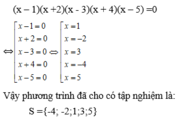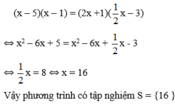Giải các phương trình sau: x x - 3 - x x - 5 = x x - 4 - x x - 6
PB
Những câu hỏi liên quan
3.15 giải các phương trình sau :
a) ( x - 6 ) ( 2x - 5 ) ( 3x + 9 ) = 0
b) 2x( x - 3 ) + 5( x - 3 ) = 0
c) ( x^2 - 4 ) - ( x - 2 ) ( 3 - 2x ) =0
3.16 tìm m để phương trình sau có nghiệm :
x=-7 ( 2m - 5 )x - 2m^2 + 8
3.17 giải các phương trình sau :
a) ( 2x - 1 )^2 - ( 2x + 1 ) = 0
\(a,\left(x-6\right)\left(2x-5\right)\left(3x+9\right)=0\Leftrightarrow\left[{}\begin{matrix}x-6=0\Leftrightarrow x=6\\2x-5=0\Leftrightarrow x=\dfrac{5}{2}\\3x+9=0\Leftrightarrow x=-3\end{matrix}\right.\)
\(b,2x\left(x-3\right)+5\left(x-3\right)=0\Leftrightarrow\left(2x+5\right)\left(x-3\right)=0\Leftrightarrow\left[{}\begin{matrix}x-3=0\Leftrightarrow x=3\\2x+5=0\Leftrightarrow x=-\dfrac{5}{2}\end{matrix}\right.\)
\(c,x^2-4-\left(x-2\right)\left(3-2x\right)=0\Leftrightarrow\left(x-2\right)\left(x+2\right)-\left(x-2\right)\left(3-2x\right)=0\Leftrightarrow\left(x-2\right)\left(x+2-3+2x\right)=0\Leftrightarrow\left[{}\begin{matrix}x=2\\x=\dfrac{1}{3}\end{matrix}\right.\)
\(x=-7\left(2m-5\right)x-2m^2+8\Leftrightarrow x+7\left(2m-5\right)=8-2m^2\Leftrightarrow x\left(14m-34\right)=8-2m^2\)
\(ycđb\Leftrightarrow14m-34\ne0\Leftrightarrow m\ne\dfrac{34}{14}\)\(\Rightarrow x=\dfrac{8-2m^2}{14m-34}\)
\(3.17\Leftrightarrow4x^2-4x+1-2x-1=0\Leftrightarrow4x^2-6x=0\Leftrightarrow x\left(4x-6\right)=0\Leftrightarrow\left[{}\begin{matrix}x=0\\x=\dfrac{3}{2}\end{matrix}\right.\)
Đúng 2
Bình luận (0)
3.15:
a, \(\Leftrightarrow\left\{{}\begin{matrix}x-6=0\\2x-5=0\\3x+9=0\end{matrix}\right.\Leftrightarrow\left\{{}\begin{matrix}x=6\\x=\dfrac{5}{2}\\x=-\dfrac{9}{3}=-3\end{matrix}\right.\)
b, \(\Leftrightarrow\left(x-3\right)\left(2x+5\right)=0\)
\(\Leftrightarrow\left\{{}\begin{matrix}x-3=0\\2x+5=0\end{matrix}\right.\Leftrightarrow\left\{{}\begin{matrix}x=3\\x=-\dfrac{5}{2}\end{matrix}\right.\)
c, \(\Leftrightarrow\left(x-2\right)\left(x+2\right)-\left(x-2\right)\left(3-2x\right)=0\)
\(\Leftrightarrow\left(x-2\right)\left(x+2-3+2x\right)=0\)
\(\Leftrightarrow\left\{{}\begin{matrix}x-2=0\\3x-1=0\end{matrix}\right.\Leftrightarrow\left\{{}\begin{matrix}x=2\\x=\dfrac{1}{3}\end{matrix}\right.\)
3.16
\(\Leftrightarrow\left(2m-5\right).-7-2m^2+8=0\)
\(\Leftrightarrow-14m+35-2m^2+8=0\)
\(\Leftrightarrow-14m-2m^2+43=0\)
\(\Leftrightarrow-2\left(7m+m^2\right)=-43\)
\(\Leftrightarrow m\left(7-m\right)=\dfrac{43}{2}\)
\(\Leftrightarrow\dfrac{m\left(7-m\right)}{1}-\dfrac{43}{2}=0\)
\(\Leftrightarrow\dfrac{14m-2m^2}{2}-\dfrac{43}{2}=0\)
pt vô nghiệm
Đúng 1
Bình luận (0)
1) Giải các phương trình sau : a) x-3/x=2-x-3/x+3 b) 3x^2-2x-16=0 2) Giải bất phương trình sau: 4x-3/4>3x-5/3-2x-7/12
\(a,\dfrac{x-3}{x}=\dfrac{x-3}{x+3}\)\(\left(đk:x\ne0,-3\right)\)
\(\Leftrightarrow\dfrac{x-3}{x}-\dfrac{x-3}{x+3}=0\)
\(\Leftrightarrow\dfrac{\left(x-3\right)\left(x+3\right)-x\left(x-3\right)}{x\left(x+3\right)}=0\)
\(\Leftrightarrow x^2-9-x^2+3x=0\)
\(\Leftrightarrow3x-9=0\)
\(\Leftrightarrow3x=9\)
\(\Leftrightarrow x=3\left(n\right)\)
Vậy \(S=\left\{3\right\}\)
Đúng 1
Bình luận (0)
\(b,\dfrac{4x-3}{4}>\dfrac{3x-5}{3}-\dfrac{2x-7}{12}\)
\(\Leftrightarrow\dfrac{4x-3}{4}-\dfrac{3x-5}{3}+\dfrac{2x-7}{12}>0\)
\(\Leftrightarrow\dfrac{3\left(4x-3\right)-4\left(3x-5\right)+2x-7}{12}>0\)
\(\Leftrightarrow12x-9-12x+20+2x-7>0\)
\(\Leftrightarrow2x+4>0\)
\(\Leftrightarrow2x>-4\)
\(\Leftrightarrow x>-2\)
Đúng 1
Bình luận (0)
Giải các phương trình sau: (x – 1)(x – 3)(x + 5)(x + 7) = 0
(x – 1)(x – 3)(x + 5)(x + 7) = 0

Vậy tập nghiệm của phương trình là S = { -7;-5;1;3}
Đúng 0
Bình luận (0)
giải các phương trình sau
x - 5 = 3 - x
x-5=3-x
<=> x+x=3+5
<=> 2x=8
<=>x=4
Vậy tập nghiệm của pt là S={4}
Đúng 3
Bình luận (0)
giải các phương trình sau
x - 5 = 3 - x
<=> 2x = 8
<=> x = 4
Vậy phương trình có nghiệm là: S = {4}
Đúng 3
Bình luận (0)
\(x-5=3-x\\ \Leftrightarrow x+x=3+5\\ \Leftrightarrow2x=8\\ \Leftrightarrow x=4\)
Đúng 3
Bình luận (0)
Xem thêm câu trả lời
Giải các phương trình sau: (x – 1)(x +2)(x - 3)(x + 4)(x – 5) = 0
Giải các phương trình sau: ( x - 5 ) ( x - 1 ) = ( 2 x + 1 ) 1 2 x - 3
bài 1 : Giải các phương trình sau: a/ 4x + 20 = 0
b/ 2x – 3 = 3(x – 1) + x + 2
bài 2 : Giải các phương trình sau: a/ (3x – 2)(4x + 5) = 0
b/ 2x(x – 3) – 5(x – 3) = 0
a/ 4x + 20 = 0
⇔4x = -20
⇔x = -5
Vậy phương trình có tập nghiệm S = {-5}
b/ 2x – 3 = 3(x – 1) + x + 2
⇔ 2x-3 = 3x -3+x+2
⇔2x – 3x = -3+2+3
⇔-2x = 2
⇔x = -1
Vậy phương trình có tập nghiệm S = {-1}
Đúng 0
Bình luận (0)
câu tiếp theo
a/ (3x – 2)(4x + 5) = 0
3x – 2 = 0 hoặc 4x + 5 = 0
3x – 2 = 0 => x = 3/24x + 5 = 0 => x = – 5/4Vậy phương trình có tập nghiệm S= {-5/4,3/2}
b/ 2x(x – 3) – 5(x – 3) = 0
=> (x – 3)(2x -5) = 0
=> x – 3 = 0 hoặc 2x – 5 = 0
* x – 3 = 0 => x = 3
* 2x – 5 = 0 => x = 5/2
Vậy phương trình có tập nghiệm S = {0, 5/2}
Đúng 0
Bình luận (0)
b1
a. 4x+ 20=0 <=> 4x= -20 <=> x= -20/4 <=> x= -5
b. 2x- 3= 3(x- 1)+ x+ 2 <=> 2x- 3= 3x- 3+ x+ 2
<=> 2x- 3= 4x- 1 <=> 2x- 4x= -1+ 3 <=> -2x= 2
<=> x= 2/-2 <=> x= -1
b2
a. (3x- 2)(4x+ 5)= 0
<=>\(\orbr{\begin{cases}3x-2=0\\4x+5=0\end{cases}\Leftrightarrow\orbr{\begin{cases}3x=2\\4x=-5\end{cases}}}\)
<=>\(\orbr{\begin{cases}x=\frac{2}{3}\\x=-\frac{5}{4}\end{cases}}\)
b. 2x(x- 3)- 5(x- 3)= 0
<=> (x- 3)(2x- 5)= 0
<=> \(\orbr{\begin{cases}x-3=0\\2x-5=0\end{cases}\Leftrightarrow}\orbr{\begin{cases}x=3\\2x=5\end{cases}}\)
<=> \(\orbr{\begin{cases}x=3\\x=\frac{5}{2}\end{cases}}\)
Đúng 0
Bình luận (0)
Giải các phương trình sau: (5 − x).log(x − 3) = 0
Giải các phương trình sau:
2
(
x
+
5
)
3
+
x
+
12
2
-
5
(
x
-
2
)
6
x
3
+
11
Đọc tiếp
Giải các phương trình sau: 2 ( x + 5 ) 3 + x + 12 2 - 5 ( x - 2 ) 6 = x 3 + 11
Ta có:


⇔ 4x + 20 + 3x + 36 - 5x + 10 = 2x + 66
⇔ 0x = 0
⇒ Phương trình đã cho vô số nghiệm.
Vậy phương trình đã cho vô số nghiệm.
Đúng 0
Bình luận (0)
Giải các phương trình sau: x 2 - 1 ( x + 2 ) ( x - 3 ) = ( x - 1 ) x 2 - 4 ( x + 5 )

⇔ ( x - 1 )( x + 2 )( 7 - 5x ) = 0

Vậy phương trình có tập nghiệm là S = { - 2; 1; 7/5 }.
Đúng 0
Bình luận (0)






